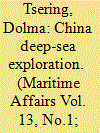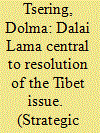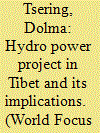|
|
|
Sort Order |
|
|
|
Items / Page
|
|
|
|
|
|
|
| Srl | Item |
| 1 |
ID:
154586


|
|
|
|
|
| Summary/Abstract |
In the last few decades, given China's growing dependency on the maritime realm, it has shifted its focus from securing borders to the pursuit of national maritime interests. China is overly dependent on the seas for maritime trade, secure energy supply, access to marine resources and access to the resources outside its borders. In this context, deep-sea exploration and capacity building emerge as important indicators of China's growing dependency on and interest in the maritime domain. Beijing's interest in deep-sea exploration and capacity building includes underwater resource exploitation, developing new technology and infrastructure related to deep-sea exploration, and maritime security. Given that China's deep-sea exploration is enmeshed with its larger geostrategic interests outside its borders, it raises a series of concerns for states in its neighbourhood. The military application of these deep-sea technologies is of greatest concern, besides power projection in the regional security domain. This paper seeks to study China's deep-sea exploration and capacity building in the context of technology and infrastructure. The paper covers contested intentions behind China's deep-sea exploration and the implications as well as concerns for China's neighbouring countries.
|
|
|
|
|
|
|
|
|
|
|
|
|
|
|
|
| 2 |
ID:
127465


|
|
|
|
|
| Publication |
2014.
|
| Summary/Abstract |
Since June 2013, there has been a spate of activity on the Tibet controversy. Sparking it off was the interview of Professor Jin Wei1 from the Central Party School in Asian Weekly2 on June 6, entitled 'Reopen Talks and Resolve Tibetan Issues', in which she advocated engaging the Dalai Lama rather than demonising him. Soon after, the International Campaign of Tibet reported that China had lifted the 17-year ban on the display of Dalai Lama portraits in Sichuan and Qinghai. On the other hand, on July 6, the Tibetans who had gathered to mark the 78th birth anniversary of the Dalai Lama in Tuwa county were fired upon by Chinese security forces. The State Administration for Religious Affairs reiterated: 'Our policy toward the Dalai clique is clear and consistent, and has not changed'.3 Yu Zhengsheng, a member of the Standing Committee of the Political Bureau of the Communist Party of China (CPC) declared: 'Only when the Dalai Lama publicly announces that Tibet is an inalienable part of China since ancient times, gives up the stance of "Tibet independence" and stops his secessionist activities, can his relations with the CPC Central Committee possibly be improved'.4 These developments suggest that China continues to remain serious about resolving the Tibet issue, especially regarding the Dalai Lama's role. This commentary seeks to analyse different aspects of understanding on the Dalai Lama's role in the resolution of the Tibet issue.
|
|
|
|
|
|
|
|
|
|
|
|
|
|
|
|
| 3 |
ID:
129661


|
|
|
|
|
| Publication |
2014.
|
| Summary/Abstract |
In contemporary international politics, the competition as well as cooperation between two most powerful countries: America and China have remained as a most interesting topic to be debate and discussed about. China rank second largest economy in the world and the kind of influences it spread across the world through its economic power are where most of the analyses of these debate and discussion lie on. Whether China's economic power will remain continues to grow or not depend on the source of its economic growth. In such case, apart from various other factors, energy production remained as one of the basic necessities. Therefore, China energy demands increased at an unprecedented level. In 2010, China became world's largest energy consumer by consuming 23 percent of total world energy consumption by overtaking the US position.
|
|
|
|
|
|
|
|
|
|
|
|
|
|
|
|
|
|
|
|
|